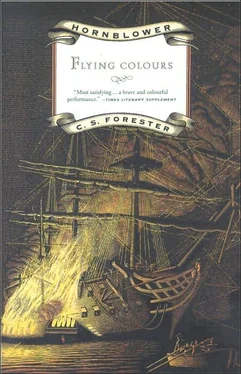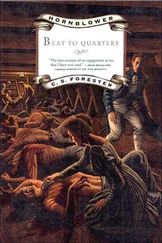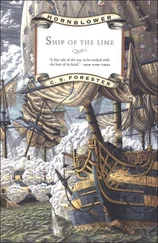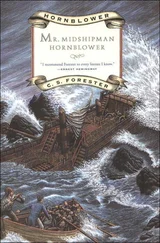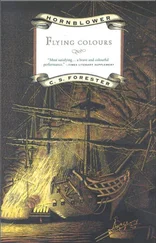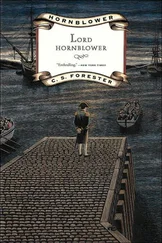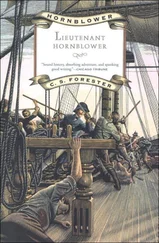Cecil Forester - Flying Colours
Здесь есть возможность читать онлайн «Cecil Forester - Flying Colours» весь текст электронной книги совершенно бесплатно (целиком полную версию без сокращений). В некоторых случаях можно слушать аудио, скачать через торрент в формате fb2 и присутствует краткое содержание. Год выпуска: 1989, ISBN: 1989, Издательство: Back Bay Books, Жанр: Исторические приключения, Путешествия и география, Морские приключения, на английском языке. Описание произведения, (предисловие) а так же отзывы посетителей доступны на портале библиотеки ЛибКат.
- Название:Flying Colours
- Автор:
- Издательство:Back Bay Books
- Жанр:
- Год:1989
- ISBN:0316289396
- Рейтинг книги:5 / 5. Голосов: 1
-
Избранное:Добавить в избранное
- Отзывы:
-
Ваша оценка:
- 100
- 1
- 2
- 3
- 4
- 5
Flying Colours: краткое содержание, описание и аннотация
Предлагаем к чтению аннотацию, описание, краткое содержание или предисловие (зависит от того, что написал сам автор книги «Flying Colours»). Если вы не нашли необходимую информацию о книге — напишите в комментариях, мы постараемся отыскать её.
Flying Colours — читать онлайн бесплатно полную книгу (весь текст) целиком
Ниже представлен текст книги, разбитый по страницам. Система сохранения места последней прочитанной страницы, позволяет с удобством читать онлайн бесплатно книгу «Flying Colours», без необходимости каждый раз заново искать на чём Вы остановились. Поставьте закладку, и сможете в любой момент перейти на страницу, на которой закончили чтение.
Интервал:
Закладка:
Your firm friend,
BARBARA LEIGHTONHornblower nervously cleared his throat and re-read the letter. There was too much crowded in it for him to have any emotion left. Richard Arthur Horatio Hornblower, with two Wellesleys as godfathers, and growing in intelligence every day. There would be a great future ahead of him, perhaps. Up to that moment Hornblower had hardly thought about the child—his paternal instincts had hardly been touched by any consideration of a child he had never seen; and they further were warped by memories of the little Horatio who had died of smallpox in his arms so many years ago. But now he felt a great wave of affection for the unknown little brat in London who had managed to endear himself to Barbara.
And Barbara had taken him in charge; possibly because, widowed and childless, she had sought for a convenient orphan to adopt—and yet it might be because she still cherished memories of Captain Hornblower, whom at the time she had believed to be dead at Bonaparte’s hands.
He could not bear to think about it any more. He thrust the letter into his pocket—all the others he had dropped on the deck—and with immobile face he met Bush’s gaze again.
“There are all these other letters, sir,” said Bush, with masterly tact.
They were letters from great men and from madmen—one contained an ounce of snuff as a token of some eccentric squire’s esteem and regard—but there was only one which caught Hornblower’s attention. It was from some Chancery Lane lawyer—the name was unfamiliar—who wrote, it appeared, on hearing from Lady Barbara Leighton that the presumption of Captain Hornblower’s death was unfounded. Previously he had been acting under the instructions of the Lords Commissioners of the Admiralty to settle Captain Hornblower’s estate, and working in conjunction with the Prize Agent at Port Mahon. With the consent of the Lord Chancellor, upon the death intestate of Mrs Maria Hornblower, he had been acting as trustee to the heir, Richard Arthur Horatio Hornblower, and had invested for the latter in the Funds the proceeds of the sale of Captain Hornblower’s prizes after the deduction of expenses. As Captain Hornblower would see from the enclosed account, there was the sum of three thousand two hundred and ninety-one pounds six and fourpence invested in the Consolidated Fund, which would naturally revert to him. The lawyer awaited his esteemed instructions.
The enclosed accounts, which Hornblower was about to thrust aside, had among the innumerable six and eightpences and three and fourpences one set of items which caught his eye—they dealt with the funeral expenses of the late Mrs Hornblower, and a grave in the cemetery of the church of St. Thomas à Beckett, and a headstone, and fees for grave-watchers; it was a ghoulish list which made Hornblower’s blood run a little colder. It was hateful. More than anything else it accentuated his loss of Maria—he would only have to go on deck to see the tower of the church where she lay.
He fought down the depression which threatened to overmaster him once more. It was at least a distraction to think about the news in that lawyer’s letter, to contemplate the fact that he owned three thousand odd pounds in the Funds. He had forgotten all about those prizes he had made in the Mediterranean before he came under Leighton’s command. Altogether that made his total fortune nearly six thousand pounds—not nearly as large as some captains had contrived to acquire, but handsome enough. Even on half-pay he would be able to live in comfort now, and educate Richard Arthur Horatio properly, and take his place in a modest way in society.
“The captain’s list has changed a lot since we saw it last, sir,” said Bush, and he was echoing Hornblower’s train of thought rather than breaking into it.
“Have you been studying it?” grinned Hornblower.
“Of course, sir.”
Upon the position of their names in that list depended the date of their promotion to flag rank—year by year they would climb it as death or promotion eliminated their seniors, until one day, if they lived long enough, they would find themselves admirals, with admirals’ pay and privileges.
“It’s the top half of the list which has changed most, sir,” said Bush. “Leighton was killed, and Ball died at Malta, and Troubridge was lost at sea—in Indian waters, sir—and there’s seven or eight others who’ve gone. You’re more than halfway up now.”
Hornblower had held his present rank eleven years, but with each coming year he would mount more slowly, in proportion to the decrease in number of his seniors, and it would be 1825 or so before he could fly his flag. Hornblower remembered the Count de Graçay’s prediction that the war would end in 1814—promotion would be slower in peace time. And Bush was ten years older than he, and only just beginning the climb. Probably he would never live to be an admiral, but then Bush was perfectly content with being a captain. Clearly his ambition had never soared higher than that; he was fortunate.
“We’re both of us very lucky men, Bush,” said Hornblower.
“Yes, sir,” agreed Bush, and hesitated before going on. “I’m giving evidence at the court martial, sir, but of course you know what my evidence’ll be. They asked me about it at Whitehall, and they told me that what I was going to say agreed with everything they knew. You’ve nothing to fear from the court martial, sir.”
Chapter Eighteen
Hornblower told himself often during the next twenty-four hours that he had nothing to fear from the court martial, and yet it was nervous work waiting for it—to hear the repeated twitter of pipes and stamping of marines’ boots overhead as the compliments were given to the captains and admirals who came on board to try him, to hear silence close down on the ship as the court assembled, and to hear the sullen boom of the court martial gun as the court opened, and the click of the cabin door latch as Calendar came to escort him before his judges.
Hornblower remembered little enough afterwards of the details of the trial—only a few impressions stood out clearly in his memory. He could always recall the flash and glitter of the gold lace on the coats of the semicircle of officers sitting round the table in the great cabin of the Victory, and the expression on Bush’s anxious, honest face as he declared that no captain could have handled a ship with more skill and determination than Hornblower had handled Sutherland at Rosas Bay. It was a neat point which Hornblower’s ‘friend’—the officer the Admiralty had sent to conduct his defence—made when his question brought out the fact that just before the surrender Bush had been completely incapacitated by the loss of his foot, so that he bore no responsibility whatever for the surrender and had no interest in presenting as good a case as possible. There was an officer who read, seemingly for an eternity, long extracts from depositions and official reports, in a spiritless mumble—the greatness of the occasion apparently made him nervous and affected his articulation, much to the annoyance of the President of the Court. At one point the President actually took the paper from him, and himself read, in his nasal tenor, Admiral Martin’s pronouncement that the Sutherland’s engagement had certainly made the eventual destruction of the French squadron more easy, and in his opinion was all that had made it possible. There was an awkward moment when a discrepancy was detected between the signal logs of the Pluto and Caligula, but it passed away in smiles when someone reminded the Court that signal midshipmen sometimes made mistakes.
During the adjournment there was an elegant civilian in buff and blue, with a neat silk cravat, who came into Hornblower with a good many questions. Frere, his name was, Hookham Frere—Hornblower had a vague acquaintance with the name. He was one of the wits who wrote in the Anti-Gallican, a friend of Canning’s, who for a time had acted as ambassador to the patriot government of Spain. Hornblower was a little intrigued by the presence of someone deep in cabinet secrets, but he was too preoccupied, waiting for the trial to re-open, to pay much attention to him or to answer his questions in detail.
Читать дальшеИнтервал:
Закладка:
Похожие книги на «Flying Colours»
Представляем Вашему вниманию похожие книги на «Flying Colours» списком для выбора. Мы отобрали схожую по названию и смыслу литературу в надежде предоставить читателям больше вариантов отыскать новые, интересные, ещё непрочитанные произведения.
Обсуждение, отзывы о книге «Flying Colours» и просто собственные мнения читателей. Оставьте ваши комментарии, напишите, что Вы думаете о произведении, его смысле или главных героях. Укажите что конкретно понравилось, а что нет, и почему Вы так считаете.
